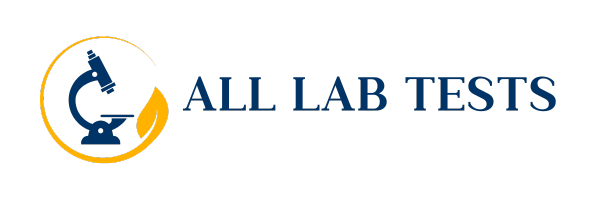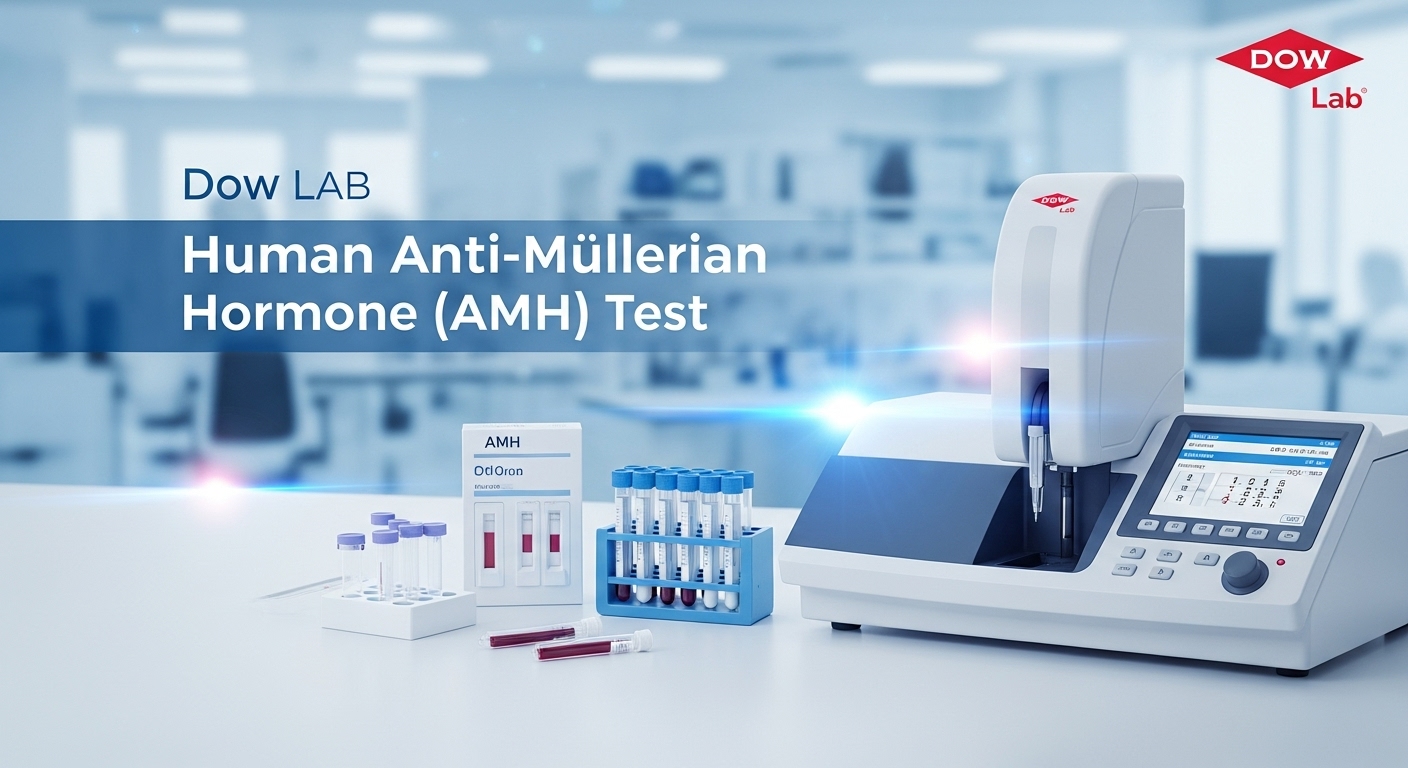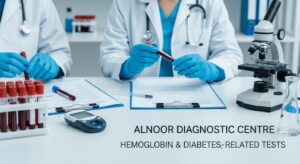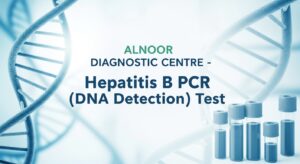The Human Anti-Müllerian Hormone (AMH) Test is an essential diagnostic tool for assessing a woman’s ovarian reserve, a key indicator of fertility potential. This test measures the level of AMH in the blood, which reflects how many eggs remain in the ovaries. AMH levels are also used in evaluating reproductive health, diagnosing conditions like polycystic ovary syndrome (PCOS), and planning fertility treatments such as IVF.
At Dow Lab, one of Pakistan’s most trusted diagnostic laboratories, the Human Anti-Müllerian Hormone (AMH) Test is performed with high accuracy using advanced immunoassay technology. The lab’s commitment to precision, affordability, and timely reporting makes it a preferred choice among both doctors and patients.
If you’re considering fertility evaluation or your gynecologist has recommended this test, understanding the process, preparation, and cost can help you make informed decisions.
What is the Human Anti-Müllerian Hormone (AMH) Test?
The AMH test measures the amount of Anti-Müllerian Hormone in your blood. AMH is produced by small follicles in the ovaries, and its level gives doctors a good idea of how many viable eggs you have left, often referred to as the ovarian reserve.
When is the AMH test recommended?
Doctors recommend the AMH test in several cases, including:
- Evaluating fertility potential in women planning to conceive
- Assessing ovarian reserve before assisted reproductive techniques (IVF, ICSI, etc.)
- Diagnosing conditions like PCOS (Polycystic Ovary Syndrome)
- Monitoring ovarian function after chemotherapy or ovarian surgery
- Investigating early menopause or premature ovarian failure
For men, AMH testing is rarely performed but can help assess testicular function in some rare medical cases.
Why is the AMH Test Important?
Understanding your AMH level provides vital insights into reproductive health. The test is not just for women struggling to conceive it’s also an excellent preventive tool for any woman who wants to plan her reproductive future.
Here’s why the Dow Lab Human Anti-Müllerian Hormone Test is important:
- Predicts Fertility Window: AMH levels reflect how many eggs are left in your ovaries, helping you plan pregnancy effectively.
- Helps Diagnose PCOS: Higher-than-normal AMH levels may suggest polycystic ovaries, guiding your doctor toward early intervention.
- Assists in IVF Planning: Reproductive specialists use AMH results to determine the right dose of stimulation drugs during fertility treatments.
- Indicates Menopause Timing: Low AMH levels can indicate that menopause is approaching, even before symptoms appear.
- Monitors Ovarian Health: After chemotherapy or surgery, AMH helps assess if ovarian function has been affected.
In short, this test offers an early window into reproductive aging and helps guide fertility-related medical decisions.
When Should You Get an AMH Test?
You should consider getting the AMH test at Dow Lab if:
- You’ve been trying to conceive for over 6-12 months without success.
- You’re planning to delay pregnancy but want to know your fertility status.
- Your doctor suspects PCOS due to irregular periods or hormonal imbalance.
- You’re undergoing IVF or other fertility treatments.
- You’ve undergone chemotherapy, radiation, or ovarian surgery.
- You’re experiencing symptoms of early menopause (hot flashes, irregular cycles, mood swings).
Doctors also recommend AMH testing for women over 30 as part of a routine fertility evaluation, even if they are not actively trying to conceive.
How to Prepare for the Human Anti-Müllerian Hormone (AMH) Test?
Preparing for the AMH test is simple and convenient. Here’s what you need to know before visiting Dow Lab:
- No fasting required: You can eat and drink normally before the test.
- Continue your regular medications: Unless advised otherwise by your doctor.
- Best time for testing: The test can be done on any day of your menstrual cycle, though some doctors prefer specific days for consistency.
- Stay relaxed: Stress can affect hormone levels indirectly, so try to rest well before your appointment.
At Dow Lab, you can walk in for the test or book online for added convenience. Their professional staff ensures comfort and privacy during sample collection.
How is the AMH Test Performed at Dow Lab?
At Dow Lab, the Human Anti-Müllerian Hormone Test is conducted through a simple blood sample. Here’s how it’s done:
- Sample Collection: A trained phlebotomist collects a small blood sample from a vein in your arm.
- Sample Processing: The blood sample is sent to the Dow Lab’s state-of-the-art biochemistry section, where automated immunoassay analyzers measure the AMH levels precisely.
- Quality Assurance: Dow Lab follows strict internal and external quality control protocols to ensure accuracy and reliability in every report.
- Result Delivery: Test reports are usually available within 24 hours. You can collect them from the lab or download them online.
The entire process takes less than 10 minutes, and no recovery time is needed afterward.
AMH Test Report & Normal Values
The AMH test report provides your hormone level in nanograms per milliliter (ng/mL). These values help doctors interpret ovarian reserve and fertility potential.
Normal AMH Level Chart
| Age Group | Normal AMH Range (ng/mL) | Interpretation |
| 20-29 years | 3.0 – 4.5 | Excellent ovarian reserve |
| 30-34 years | 2.0 – 3.5 | Good ovarian reserve |
| 35-39 years | 1.0 – 2.5 | Moderate ovarian reserve |
| 40-44 years | 0.5 – 1.0 | Low ovarian reserve |
| 45+ years | < 0.5 | Very low / near menopause |
Note: Reference ranges may slightly vary depending on the testing method and laboratory standards.
Interpretation:
- High AMH (>4.5 ng/mL): May indicate PCOS or excessive ovarian follicles.
- Normal AMH (1.0-4.5 ng/mL): Suggests healthy ovarian reserve.
- Low AMH (<1.0 ng/mL): May suggest declining ovarian reserve or approaching menopause.
Always discuss your report with a qualified gynecologist or endocrinologist for accurate diagnosis and treatment guidance.
Understanding Abnormal Results
If your AMH level is too low, it might indicate:
- Reduced ovarian reserve
- Premature ovarian failure
- Approaching menopause
- Damage from chemotherapy or surgery
If your AMH level is high, it could suggest:
- Polycystic Ovary Syndrome (PCOS)
- Ovarian hyperstimulation (in fertility treatments)
- Granulosa cell tumors (rare ovarian growths)
Abnormal results should never be self-interpreted. Your doctor may recommend additional tests such as FSH, LH, Estradiol, or Pelvic Ultrasound to confirm diagnosis.
How to Improve Reproductive Health Naturally
While AMH levels are largely influenced by age and genetics, certain lifestyle changes may support better reproductive health:
- Maintain a healthy weight: Both obesity and being underweight can affect hormone balance.
- Eat a balanced diet: Include antioxidant-rich foods (fruits, vegetables, nuts, whole grains).
- Avoid smoking and alcohol: These accelerate ovarian aging.
- Reduce stress: Chronic stress impacts hormonal stability.
- Get regular exercise: Helps improve blood flow and hormonal function.
These steps can help optimize your body’s overall hormonal health and support fertility.
Human Anti-Müllerian Hormone (AMH) Test Cost at Dow Lab
The Human Anti-Müllerian Hormone (AMH) Test cost at Dow Lab is Rs. 120. This affordable rate ensures that more women can access fertility testing without financial strain.
Dow Lab offers accurate testing, modern equipment, and expert reporting, ensuring dependable results at a competitive price.
You can book your AMH test online through All Lab Tests or visit the nearest Dow Laboratory branch for sample collection.
Dow Lab AMH Test Price in Pakistan
The Dow Lab Human Anti-Müllerian Hormone Test Price in Pakistan is Rs. 120. Whether you’re in Karachi, Lahore, or another city, you can easily book this test online and get your sample collected at any nearby Dow Lab collection center.
All Lab Tests make it simple to compare diagnostic test prices, view Dow Lab test charges 2025, and choose the best laboratory for your healthcare needs.
Related Hormonal Test Prices at Dow Lab
Below is a detailed price list of related fertility and hormonal tests available at Dow Diagnostic Laboratory:
| Test Name | Price (PKR) |
| SERUM FSH | 1000 |
| SERUM LH | 890 |
| SERUM PROLACTIN | 890 |
| SERUM PROGESTERONE | 890 |
| SERUM TESTOSTERONE | 1240 |
| ESTRADIOL | 1300 |
| SHBG (SEX HORMONE BINDING GLOBULIN) | 1500 |
| ESTROGEN RECEPTOR & PROGESTERONE RECEPTOR | 7360 |
| SERUM HCG | 1270 |
| SERUM BETA HCG | 1300 |
| SERUM INSULIN | 1120 |
These tests are commonly ordered together with AMH testing for a complete fertility and hormonal profile, especially for women undergoing fertility evaluation or treatment.
Where to Book AMH Test in Pakistan
Searching for a “Human Anti-Müllerian Hormone (AMH) Test near me”? You can easily find and compare AMH test costs in Pakistan through All Lab Tests, a trusted online platform connecting you with top diagnostic centers nationwide.
- Compare Dow Lab test prices and services
- Check updated 2025 test rates
- Book your AMH test online in minutes
- Get your results quickly and securely
No long queues, no confusion, just reliable diagnostics made simple.
Book Your Human Anti-Müllerian Hormone Test at Dow Lab
Ready to check your fertility health?
Book your Human Anti-Müllerian Hormone (AMH) Test at Dow Lab today!
With advanced technology, expert pathologists, and nationwide collection centers, Dow Lab ensures precise results and a smooth testing experience.
Book online through All Lab Tests and enjoy:
- Easy appointment scheduling
- Affordable test rates
- Fast, digital reports
- Professional service and patient privacy
Take control of your reproductive health today with the Dow Lab Human Anti-Müllerian Hormone Test trusted, affordable, and accurate across Pakistan.





